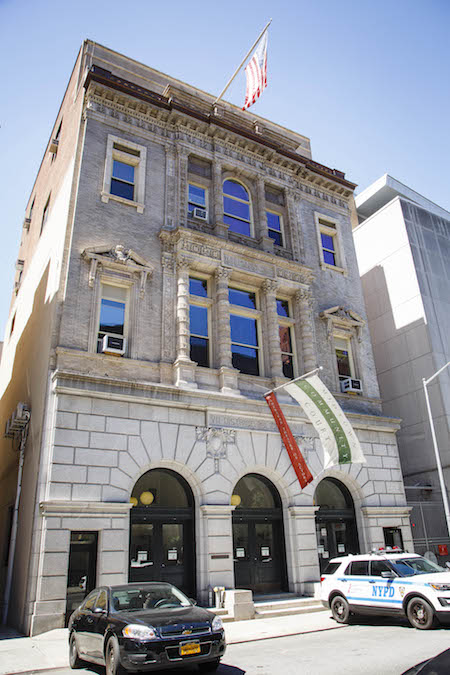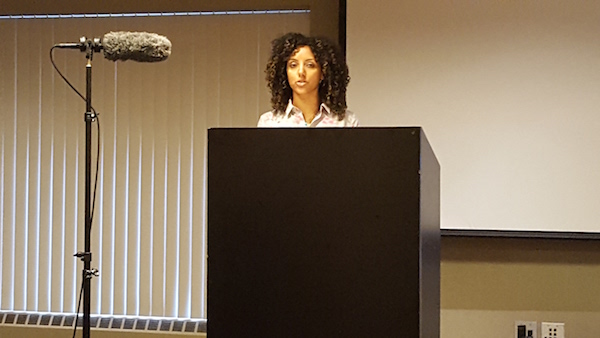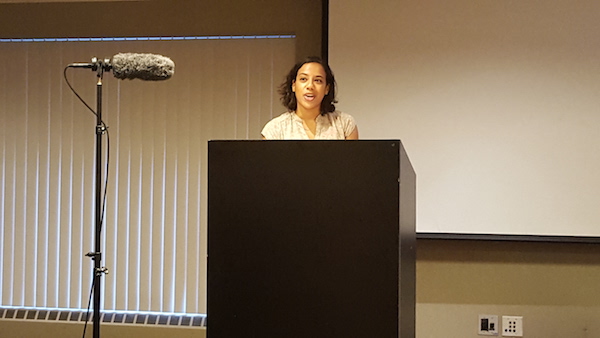
BY DUSICA SUE MALESEVIC | For over 20 years, the Midtown Community Court has been giving low-level offenders a second chance.
Called the “problem-solving court,” it offers alternatives to incarceration, Sherene Crawford, project director of the Midtown Community Court, explained.
“The idea behind the problem solving court is that we recognize and realize that there are a lot of different things that bring people into the criminal justice system,” she said. “Oftentimes the folks that are repeatedly entering the criminal justice system are facing issues … of homelessness, substance abuse, [and] mental health. If we’re not addressing those underlying issues, we will continue to see those folks.”
The court, located at 314 W. 54th St. between Eighth and Ninth Aves., is unique as it offers social services right at its building, Crawford said. “So that they can see the judge, come upstairs, and see a social worker and get appropriate services based on individual needs,” she explained at the Midtown South Community Council meeting on June 15.
Founded in 1993, the Midtown Community Court is an “operating program” of the Center for Court Innovation, a nonprofit that seeks to reform the criminal justice system, according to its website. The Center for Court Innovation is a public-private partnership between the New York State Unified Court System and the Fund for the City of New York, according to its website.
Crawford said that over time the court has evolved with the community in Midtown and “all for the better in being able to have additional types of programs and resources at the court.”
“We have one judge there everyday hearing the cases, which means she gets to know the defendants who are coming through the court,” she said. The court works closely with the Manhattan District Attorney’s Office, partners with a range of community-based organizations, and “one of our most important partners is the community along with the New York City Police Department,” Crawford said.
The Midtown Community Court has a catchment area, she explained, that includes Midtown South, Midtown North and the 10th and 20th precincts. The cases the court sees are summons, violations and misdemeanors, not felonies or serious violent crimes, Crawford said.
The court does have a couple specialized parts, one of which is focused on human trafficking, she said. The cases involve prostitution, and “we find that if we’re able to treat them more as victims than offenders and offer them services and resources that is to everyone’s benefit,” she said.

Crawford said the court sees a fair amount of young people and has an adolescent diversion part for those 16- to 20-years-old. Through a program called Project Reset, 16- and 17-year-olds arrested for low-level crimes, such as shoplifting, are able to do four hours of programming. If they complete the programming hours, the Manhattan DA’s office agrees not to write up the case so there is no criminal record, she explained.
Project Reset was started in 2015, and, according to literature Crawford handed out, “Ninety-eight percent of participants successfully completed their restorative intervention and avoided formal case processing.”
“The idea is we want to have things take place as quick as possible for anyone who’s receiving services at Midtown,” she said, noting that people can take part of individual or group counseling sessions as well as doing community service as an alternative to incarceration. Some people do their community service at the court, maintaining its facilities and being supervised by the court’s staff, she said.
Others do their community services with business improvement districts, like the Times Square Alliance, a partner of the court, Crawford said. They help do street cleanup, painting over a wall with graffiti, planting trees or flowers, as well as preparing meals for the elderly, she said.
The Times Square Alliance is also a partner of another program of the Center for Court Innovation called UPNEXT — a workforce development and fatherhood program, Awinna Martinez, program director of UPNEXT, said.
Martinez explained to the crowd at The New Yorker Hotel (481 Eighth Ave., btw. W. 34th & 35th Sts.) that it become clear that defendants coming through the Midtown Community Court needed skills to land a job — how to navigate the workplace, build a resume, and learn how to interview.
It also become clear that a lot of men who were fathers were taking part of another program called Times Square Ink, she explained, and that “these fathers had very specific challenges around meeting financial needs and taking care of their families.” Many men who had been incarcerated had issues with child support and were in arrears as it accrued while they serving time, she said.
An earlier version of UPNEXT was started in the early 2000s called Dads United for Parenting, and that program and Times Square Ink merged to form UPNEXT in 2012, Martinez said.
UPNEXT is a six-week program where fathers attend parenting classes and workforce development workshops as well as a series of cognitive behavioral therapy programming, which focuses on decision-making and positive social skills for the workplace and co-parenting, she explained.
“At UPNEXT, we work with fathers but the primary goal is the positive development of the children,” Martinez said, noting it is a preventive program. If a child’s home life is stable, she explained, they often do better at school and avoid the criminal justice system.

Graduates of the program are eligible for a transitional opportunity with the Times Square Alliance, which has been a partner for several years, Martinez said. After being vetted and interviewed, they are offered a three to six month job opportunity, which is “so beneficial for these fathers” — some come right from incarceration, she said. Martinez said about 50 percent get permanently hired with the Times Square Alliance.
The Midtown South Community Council is on hiatus until Sept. 21, when it resumes meetings at 7 p.m., third Thurs. of the month. For info, visit midtownsouthcc.org. For the Times Square Alliance, timessquarenyc.org. For info on Midtown Community Court, Project Reset, and UPNEXT, use the “search” box on the upper right hand side of the courtinnovation.org home page.































